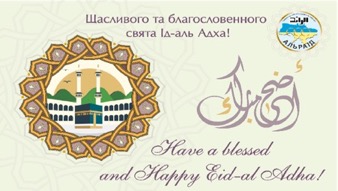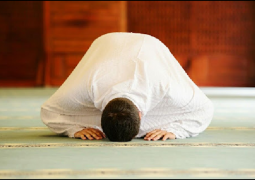
Eid al-Adha is an Islamic festival to commemorate the willingness of Prophet Ibrahim (also known as Abraham) to follow Allah’s command to sacrifice his son Ishmael. Muslims around the world observe this event. Eid al-Adha (Id ul-Adha) is a four-day Islamic festival starting on the 10th day of the month of Dhul Hijja (Thou al-Hijja) to commemorate the willingness of prophet Ibrahim (AS) to sacrifice his son. Ibrahim, known as Abraham in the Christian and Jewish traditions, was commanded by Allah to sacrifice his son. He obeyed and took Ishmael (Ismail or Ismael) to Mount Rahma. Just as he was to sacrifice his son, an angel stopped him and gave him a ram to sacrifice in place of his son.
The Islamic calendar is based on observations of the Crescent (Moon) and the length of a particular month can vary between years. For this reason, predicted dates of Eid al-Adha may be corrected at the start of the month of Dhul Hijja. This is around 10 days before the start of the festival.
At Eid al-Adha, many Muslims make a special effort to pray and listen to a sermon at a mosque or praying grounds. They also wear new clothes, visit family members and friends and may symbolically sacrifice an animal in an act known as qurbani. This represents the animal that Ibrahim (AS) sacrificed in the place of his son.
What does Eid al-Adha commemorate?
During the Hajj, Muslims remember and commemorate the trials and triumphs of the Prophet Abrahim. The Qur’an describes Abrahim as follows:
“Surely Abrahim was an example, obedient to Allah, by nature upright, and he was not of the polytheists. He was grateful for our bounties. We chose him and guided him unto a right path. We gave him good in this world, and in the next he will most surely be among the righteous.” (Qur’an 16:120-121)
One of Abrahim’s main trials was to face the command of Allah to kill his only son. Upon hearing this command, he prepared to submit to Allah’s will. When he was all prepared to do it, Allah revealed to him that his “sacrifice” had already been fulfilled. He had shown that his love for his Lord superseded all others that he would lay down his own life or the lives of those dear to him in order to submit to God.
Why do Muslims sacrifice an animal on this day?
During the celebration of Eid al-Adha, Muslims commemorate and remember Abrahim’s trials, by themselves slaughtering an animal such as a sheep, camel, or goat. This action is very often misunderstood by those outside the faith.
Allah has given us power over animals and allowed us to eat meat, but only if we pronounce His name at the solemn act of taking life. Muslims slaughter animals in the same way throughout the year. By saying the name of Allah at the time of slaughter, we are reminded that life is sacred.
The meat from the sacrifice of Eid al-Adha is mostly given away to others. One-third is eaten by immediate family and relatives, one-third is given away to friends, and one-third is donated to the poor. The act symbolizes our willingness to give up things that are of benefit to us or close to our hearts, in order to follow Allah’s commands. It also symbolizes our willingness to give up some of our own bounties, in order to strengthen ties of friendship and help those who are in need. We recognize that all blessings come from Allah, and we should open our hearts and share with others.
It is very important to understand that the sacrifice itself, as practiced by Muslims, has nothing to do with atoning for our sins or using the blood to wash ourselves from sin. This is a misunderstanding by those of previous generations: “It is neither their meat nor their blood that reaches Allah; it is your piety that reaches Him” (Qur’an 22:37).
The symbolism is in the attitude - a willingness to make sacrifices in our lives in order to stay on the Straight Path. Each of us makes small sacrifices, giving up things that are fun or important to us. A true Muslim, one who submits his or herself completely to the Lord, is willing to follow Allah’s commands completely and obediently. It is this strength of heart, purity in faith, and willing obedience that our Lord desires from us.
What else do Muslims do to celebrate Eid
On the first morning of Eid al-Adha, Muslims around the world attend morning prayers at their Mosques. Prayers are followed by visits with family and friends, and the exchange of greetings and gifts. At some point, members of the family will visit a local farm or otherwise will make arrangements for the slaughter of an animal. The meat is distributed during the days of the holiday or shortly thereafter.
FASTING ON THE DAY OF ‘ARAFAH
Abu Hafsah, May Allah be pleased with him, reported that the Prophet, upon whom be peace, said:”Fasting on the Day of ‘Arafah absolves the sins for two years: the previous year and the coming year, and fasting on ‘Ashura, (the tenth day of Muharram) atones for the sins of previous years.”Reported by all except Al-Bukhari and At-Tirmidhi. In another saying the Prophet’s wife Hafsah, may Allah be pleased with her, said:
“Four things the Messenger of Allâh never neglected: Observing fast on the day of ‘Ashura, ‘Arafat, three days every month, and offering fajr Sunnah prayers early in the morning.
“Muslim. These statements are proof that fasting on the ninth of Dhul-Hijjah, the day before ‘Eid ul-Adha was a lifelong practice of the Prophet, peace be upon him, as his wife reported. There are some reports that fasting is prohibited on the Day of ‘Arafah. However, it must be understood that this refers to a person performing the Hajj. If a person is on the Hajj, there is no fast for him or her on the day of ‘Arafah. That is undoubtedly a blessing for him because of the hardships of the pilgrimage. In a saying reported by Umm Al-Fadl, may Allah be pleased with her, she said:
“The companions doubted whether the Prophet was fasting on ‘Arafah or not. She decided to prove to them that he was not, so she said, ‘I sent to him milk, which he drank while he was delivering the khutbah (sermon) on ‘Arafah.’ “Recorded by Al-Bukhari
Prohibiting the pilgrims from fasting on these days is a great mercy for them, for fasting will exert undue hardship on the person performing the Hajj, while they are primarily concerned with their pilgrimage. Above all, the pilgrim would not be fasting anyway because he is travelling.
What is the significance of the first 10 days of Dhul-Hijjah?
Dhul-Hijjah (the Month of Hajj) is the 12th month of the Islamic lunar year. It is during this month that the annual pilgrimage to Makkah, known as Hajj, takes place. The actual pilgrimage rites take place on the 8th to 12th days of the month. According to the Prophet Muhammad, peace be upon him, the first ten days of this month are a special time for devotion. During these days, preparations are underway for those who are undertaking the pilgrimage, and most of the actual pilgrimage rites occur. In particular, the 9th day of the month marks the Day of Arafat, and the 10th day of the month marks the Eid al-Adha (Festival of Sacrifice). Even for those who are not traveling for the pilgrimage, this is a special time to remember Allah (SWT) and spend extra time in devotion and g




